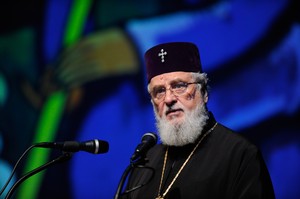On Nov. 5 the World Council of Churches (WCC) 10th Assembly hosted a plenary session on unity. The plenary invited participants to reflect on unity and the spiritual journey of fellowship grounded in prayerful reflection.
The Assembly runs through Nov. 8.
The plenary included an opportunity for participants to engage with each other to explore the contextual relevance of the ecumenical movement and the shared commitment to the vision “that all may be one, so that the world may believe,” as Jesus prayed in John 17:21.
Mary Tanner of Great Britain, moderator of the drafting group on the unity statement, introduced the plenary and called the audience into prayerful reflection on issues of unity.
Metropolitan Nifan of Târgoviste, patriarchal exarch for external and ecumenical relationships of the Patriarchate of the Romanian Orthodox Church and the Rev. Neville Callam, general secretary of the Baptist World Alliance, offered reflections on the “Journey of fellowship: hopes and challenges on the way.”
Alice Fabian, a candidate for ordained ministry with the United Congregational Church of Southern Africa who served as a member of the unity statement drafting group, and Bishop Mark MacDonald shared reflections on the “Journey of fellowship: God’s gift and calling.”
The plenary closed with an invitation to recommit to the search for unity in faith. Written prayers for unity collected from assembly participants during the plenary formed part of the closing mid-day prayer and eucharistic service.
The reflection at the plenary included artwork by two Christian visual artists from Asia, the late Sadao Watanabe of Japan and the contemporary Chinese artist He Qi, photographs by Sean Hawkey and music by Korean musicians and the Taizé community.
The Rev. Glory Dharmaraj of the United Methodist Church, who participated in the plenary, said the artwork used at the plenary was a powerful visual expression for reflection.
“I was very much touched by the presentation of Metropolitan Nifon of the Orthodox Theological Faculty, especially his appeal. Often we forget in mission that we have to be in relation both with the visible church and the invisible among us, and in this case the two bishops who were abducted from Syria,” said Dharmaraj.
In the plenary, church leaders also made a plea for the release of the abducted Syrian bishops. The Syriac Orthodox and Greek Orthodox archbishops of Aleppo, Yohanna Ibrahim and Paul Yazigi, two prominent Christian bishops who are still missing after their abduction in Aleppo province in April 2013. Their driver, an Orthodox Christian holding the office of deacon, was murdered. The condition of the two archbishops is unknown.

